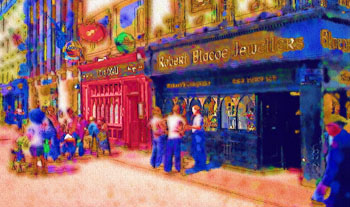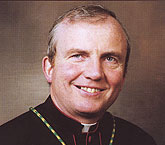| April
2009 - Vol. 29

Midday Shoppers, Galway,
Ireland, photo illustration by Don Schwager
The
Challenge of Mission in Ireland Today
a report by Louis
Power
A Sword of
the Spirit ecumenical conference in Dromantine, Northern Ireland on January
2009, hosted jointly by the Community
of Nazareth, Dublin, and Charis
Community, Belfast, was addressed by Most Reverend Dr. Donal McKeown,
Catholic Auxiliary Bishop of Down & Connor, and the Right Reverend
Ken Good, Church of Ireland Bishop of Derry & Raphoe. Also represented
at the conference were the Focolare Movement, Corrymeela Community, The
Christian Renewal Centre, John the Baptist Koinonia – renewal movements
active in Ireland.
Both bishops
affirmed how vital Christian community is for the future of mission in
Ireland. Participants came away from the conference with a greater sense
of support and encouragement for the place of renewal communities in the
wider church.

Dromantine Retreat and Conference
Center, Northern Ireland
In his address,
Bishop
McKeown stated that the world in which people of his generation grew
up was one in which language about the transcendent was an assumed part
of daily discourse, unlike today’s secularist society, as captured by the
title of a recent book, God is Missing and not Missed. The current
condition leads to a ruptured relationship between faith and culture, the
bishop explained. Secular society today works on the basis that, except
where scientific truths are involved, there is no such thing as absolute
truth; or that assumed truth is really only what a particular group decides
is truth for them. One clear trend however, Bishop McKeown stated, is the
move away from a sense of community to an emphasis on the individual.
A secularist
society today tends to promote "the right and ability to choose" as its
paramount value. But Bishop McKeown stressed that where a culture of choosing
dominates, “the choosing itself can become the good thing rather than an
evaluation of what is being chosen.”
He went on
to point out that this is not an easy time for mission in an Ireland that
has lost confidence in the narrative it had about the past, so Ireland
is thus struggling to find its way forward. He concluded that a society
that sets
at risk the values of the present and hope for the future is
all the more in need of Good News. “
Bishop McKeown
encouraged the members of the Sword of the Spirit to see the call to community
as "not just the context for human and spiritual growth but part of the
content of it. Your community is not just a useful support for your individual
and spiritual growth. Being in community is part of the proclamation of
the Gospel message."
Bishop McKeown
continued, "In a social context where relationships are not really expected
to last too long and where the temptation is always strong to move on immediately
rather than try to sort failings out, where love is seen only as an emotion
and rarely as a decision, Jesus invites his disciples to walk together.
'By the love that you have for one another will all know that you are my
disciples' (John 17:23)."
“As a community
and as churches we are here only so that we can bring our brothers and
sisters with us to the throne of Christ,” he proclaimed.
continued
on > next
page | 1
| 2
|
[Louis Power is a member
of the Community
of Nazareth, in Dublin, Ireland.] |

Quotes
from Bishop McKeown
The
exaltation of the individual has affected how many see spirituality. For
some it can become a self-indulgent and shallow browsing in a religious
supermarket, where we pick the sort of spiritual treat that we fancy. As
you know from your own understanding of your call [a community of disciples
on mission], what is now sometimes called a "spirituality of communion"
can play a vital role. We all have to develop a personal relationship with
the Father, the Son and the Spirit, even though the emphases will vary
for individuals and communities. However, that relationship with the Trinity
is lived out in the context of committed human relationships. It is there
that the call to love, forgive, grow in self acceptance, be forgiven all
develop. And a spirituality of communion is not just the context for human
and spiritual growth but part of the content of it.
Your
community is not just a useful support for your individual and spiritual
growth. Being in community is part of the proclamation of the Gospel message.
In a social context where relationships are not really expected to last
too long and where the temptation is always strong to move on immediately
rather than try to sort failings out, where love is seen only as an emotion
and rarely as a decision, Jesus invites his disciples to walk together.
“By the love that you have for one another will all know that you are my
disciples” (John 17:23).
And
a spirituality of communion is not just one that calls you to share your
lives as much as you can. It is also an invitation to make your community
as open and as welcoming as possible. That is not easy when just staying
united is a challenge. But a community that is not welcoming, that does
not have space for others to come and rest, that does not find time to
share its life, that gives the impression of excluding rather than including
– that community will find it very hard to be seen as a credible witness
to the Jesus of the Gospel. And there are many who have never felt they
belonged, or who are afraid to belong. Help them to see concrete examples
that community is better than competition. Even the possibility
of community is an important pointer to the healing grace of Jesus. If
we say that we witness to the foolishness of the Cross and the possibility
of reconciliation, the people of today say, “Don’t tell us, show us.”
continued
on > next
page | 1
| 2
|
|